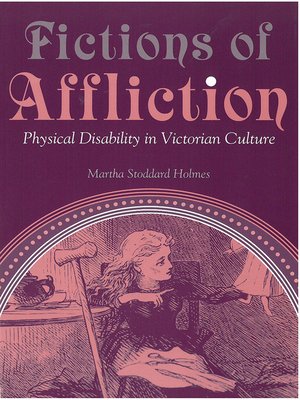Fictions of Affliction
ebook ∣ Physical Disability in Victorian Culture · Corporealities: Discourses of Disability
By Martha Stoddard Holmes

Sign up to save your library
With an OverDrive account, you can save your favorite libraries for at-a-glance information about availability. Find out more about OverDrive accounts.
Find this title in Libby, the library reading app by OverDrive.



Search for a digital library with this title
Title found at these libraries:
| Library Name | Distance |
|---|---|
| Loading... |
Reveals the cultural meanings and literary representations of disability in Victorian Britain
| Tiny Tim, Clym Yeobright, Long John Silver—-what underlies nineteenth-century British literature's fixation with disability? Melodramatic representations of disability pervaded not only novels by Dickens, but also doctors' treatises on blindness, educators' arguments for "special" education, and even the writing of disabled people themselves. Drawing on extensive primary research, Martha Stoddard Holmes introduces readers to popular literary and dramatic works that explored culturally risky questions like "can disabled men work?" and "should disabled women have babies?" and makes connections between literary plots and medical, social, and educational debates of the day. The first book of its kind, Fictions of Affliction contributes a new emphasis to Victorian literary and cultural studies and offers new readings of works by canonic and becoming-canonic writers like Dickens, Wilkie Collins, and others.
| Tiny Tim, Clym Yeobright, Long John Silver—-what underlies nineteenth-century British literature's fixation with disability? Melodramatic representations of disability pervaded not only novels by Dickens, but also doctors' treatises on blindness, educators' arguments for "special" education, and even the writing of disabled people themselves. Drawing on extensive primary research, Martha Stoddard Holmes introduces readers to popular literary and dramatic works that explored culturally risky questions like "can disabled men work?" and "should disabled women have babies?" and makes connections between literary plots and medical, social, and educational debates of the day. The first book of its kind, Fictions of Affliction contributes a new emphasis to Victorian literary and cultural studies and offers new readings of works by canonic and becoming-canonic writers like Dickens, Wilkie Collins, and others.







